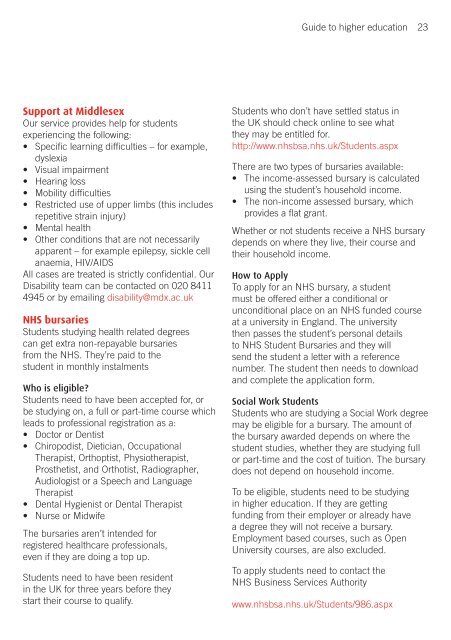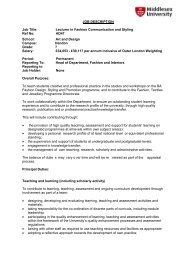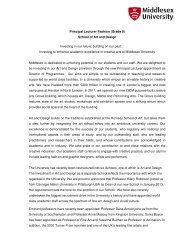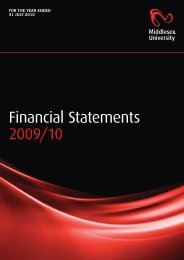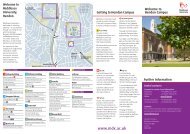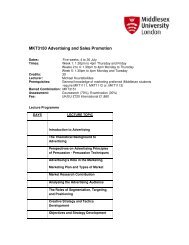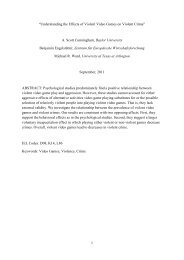Contact us: - Middlesex University
Contact us: - Middlesex University
Contact us: - Middlesex University
Create successful ePaper yourself
Turn your PDF publications into a flip-book with our unique Google optimized e-Paper software.
Guide to higher education 23<br />
Support at <strong>Middlesex</strong><br />
Our service provides help for students<br />
experiencing the following:<br />
• Specific learning difficulties – for example,<br />
dyslexia<br />
• Visual impairment<br />
• Hearing loss<br />
• Mobility difficulties<br />
• Restricted <strong>us</strong>e of upper limbs (this includes<br />
repetitive strain injury)<br />
• Mental health<br />
• Other conditions that are not necessarily<br />
apparent – for example epilepsy, sickle cell<br />
anaemia, HIV/AIDS<br />
All cases are treated is strictly confidential. Our<br />
Disability team can be contacted on 020 8411<br />
4945 or by emailing disability@mdx.ac.uk<br />
NHS bursaries<br />
Students studying health related degrees<br />
can get extra non-repayable bursaries<br />
from the NHS. They’re paid to the<br />
student in monthly instalments<br />
Who is eligible?<br />
Students need to have been accepted for, or<br />
be studying on, a full or part-time course which<br />
leads to professional registration as a:<br />
• Doctor or Dentist<br />
• Chiropodist, Dietician, Occupational<br />
Therapist, Orthoptist, Physiotherapist,<br />
Prosthetist, and Orthotist, Radiographer,<br />
Audiologist or a Speech and Language<br />
Therapist<br />
• Dental Hygienist or Dental Therapist<br />
• Nurse or Midwife<br />
The bursaries aren’t intended for<br />
registered healthcare professionals,<br />
even if they are doing a top up.<br />
Students need to have been resident<br />
in the UK for three years before they<br />
start their course to qualify.<br />
Students who don’t have settled stat<strong>us</strong> in<br />
the UK should check online to see what<br />
they may be entitled for.<br />
http://www.nhsbsa.nhs.uk/Students.aspx<br />
There are two types of bursaries available:<br />
• The income-assessed bursary is calculated<br />
<strong>us</strong>ing the student’s ho<strong>us</strong>ehold income.<br />
• The non-income assessed bursary, which<br />
provides a flat grant.<br />
Whether or not students receive a NHS bursary<br />
depends on where they live, their course and<br />
their ho<strong>us</strong>ehold income.<br />
How to Apply<br />
To apply for an NHS bursary, a student<br />
m<strong>us</strong>t be offered either a conditional or<br />
unconditional place on an NHS funded course<br />
at a university in England. The university<br />
then passes the student’s personal details<br />
to NHS Student Bursaries and they will<br />
send the student a letter with a reference<br />
number. The student then needs to download<br />
and complete the application form.<br />
Social Work Students<br />
Students who are studying a Social Work degree<br />
may be eligible for a bursary. The amount of<br />
the bursary awarded depends on where the<br />
student studies, whether they are studying full<br />
or part-time and the cost of tuition. The bursary<br />
does not depend on ho<strong>us</strong>ehold income.<br />
To be eligible, students need to be studying<br />
in higher education. If they are getting<br />
funding from their employer or already have<br />
a degree they will not receive a bursary.<br />
Employment based courses, such as Open<br />
<strong>University</strong> courses, are also excluded.<br />
To apply students need to contact the<br />
NHS B<strong>us</strong>iness Services Authority<br />
www.nhsbsa.nhs.uk/Students/986.aspx


